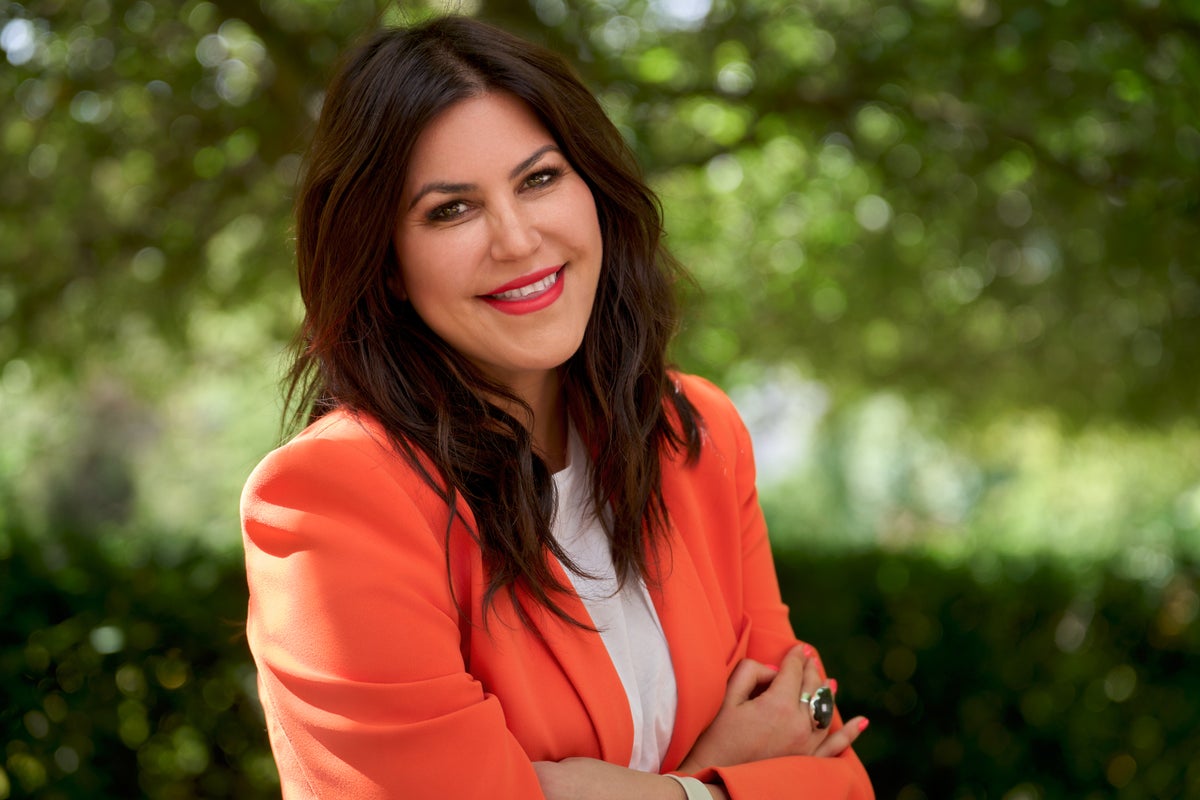
Doing one small thing every day for your mental health can help strengthen your resilience and help you feel a lot better.
When Cate Murden, 46 and from south London, was signed off work with stress for three months in 2014, she knew things had to change.
“When my mum was diagnosed with cancer in the summer of 2014, to put it simply, I had nothing in the tank to be able to deal with it,” she says.
The trauma of that diagnosis led Cate to take a series of small steps to improve her mental and physical wellbeing.
“I wake up, I journal in the morning whilst having my coffee and I do that in bed. I do a gratitude list as well, which I then send out to a number of people, we’re in a group together.
“Then I spend an hour and a half walking the dog, either along the South Bank or when I’m back home with my folks in Bournemouth.
“Normally I’m listening to an audiobook or podcast, something to get me in the right frame of mind.
“I come back and have breakfast, another coffee while I start working. That morning routine is fundamental for me.”
Cate has advice for others suffering with poor mental health.
“What’s happening in my brain versus what’s actually happening might be very different things,” she says. “So, I ask myself questions like: Is this true? Why am I seeing it like that? Does this thinking benefit me or hinder me? Could I see it another way?”
Looking after your mental health is not something just to do when it’s poor; rather, we should pro-actively maintain it, just like our physical health.
That’s because staying on top of our mental health and wellbeing helps us cope with the normal stresses of life and enables us to better deal with challenges we may face in the future. Over time, it can also reduce our risk of physical health problems.
Embedding habits into your daily routine is an important part of that process.
James Scott, who lives in East Grinstead, made the decision to address his anxiety with the help of gardening— (Supplied)
James Scott, who lives in East Grinstead, made the decision to address his anxiety with the help of a simple but powerful tool: gardening.
The 34-year-old was diagnosed with generalised anxiety disorder in 2019 after experiencing his first panic attack while on holiday.
His symptoms began to ease when he started growing plants and seeds on the kitchen table during the first Covid lockdown.
“It gave me a purpose to the day and that was what really took my mind off the situation otherwise I could be milling about indoors giving free time for anxiety to creep in,” he says.
“It was good for me because I was able to get out and work with my hands, plants and soil. I think there’s something quite calming about that.”
He also goes for walks and takes an interest in local wildlife, and regularly plays cricket, tennis, golf, and football with his teammates.
“Playing sport outdoors or being outdoors in nature, that’s when I’m at my most relaxed,” he says.
Information about how best to look after your mental health can feel overwhelming, or complicated, and you might even struggle to imagine yourself being able to do it or it having a positive effect on how you feel.
But taking simple actions can lead to a positive impact, particularly when you stick to them on a regular basis.
That is where Better Health-Every Mind Matters comes in.
The NHS-approved website is packed with free resources to help you tackle common mental health problems, be it anxiety, low mood, stress or trouble sleeping. It can also help you maintain good mental wellbeing, provides information on accessing additional support you might need for mild to moderate mental health difficulties, and helps you to look after the mental wellbeing of others.
The Every Mind Matters website offers:
- A free personalised Mind Plan - a mental health action plan that provides practical tips to help you deal with anxiety and stress, boost your mood, sleep better and feel more in control. UK based Amazon Alexa users can just say, ‘Alexa, start my Mind Plan’ for help today.
-
Email programmes:
- One offering a range of advice and guidance on making positive steps part of your daily routine for improving your mental wellbeing
- One for easing anxiety, offering expert advice and practical tips
- One for improving sleep, providing tips to create good habits for better sleep.
Use these top tips to find your little big things - little actions that can have a big impact on your mental health and wellbeing:
Get physically active
Being active is not just good for your physical health, it’s good for your mind too. It can help you burn off nervous energy, and, while it will not make feelings of distress disappear completely, it can make them less intense. Try activity that is right for your physical abilities and that you enjoy doing on a regular basis. You might choose gentle online yoga classes, boogieing around the home or short walks in the fresh air. The NHS Active 10 app can help you track and build up your daily walks or the NHSCouch to 5k app can help you gradually work towards running 5km in just 9 weeks. Download for free from the App Store or Google Play.
Manage your feelings
Our thoughts, feelings and behaviour are closely linked and influence each other. Sometimes we develop unhelpful patterns of thought and these can lead to unhelpful behaviour, so recognising them and thinking about them differently can improve our mental wellbeing.
You may have heard of CBT (cognitive behavioural therapy) which aims to help us do this and improve how we feel. Every Mind Matters offers free, practical, CBT-inspired self-help tips and techniques you can try to help deal with worries and unhelpful thoughts, and work through problems in new ways to help your mental wellbeing.
Talk to someone you trust
Talking to someone we trust about how we’re feeling can improve our mental health and wellbeing and help stop us from feeling lonely. Opening up to friends or family may seem difficult – you might be concerned about what they’ll think – but sharing how you are feeling will help them understand what you’re going through and together you can explore solutions. Choose the means of communication that feels right for you, whether it’s online, over the phone or in person. You might find it helps to make notes about what you’d like to say. And make it a habit: you probably won’t talk about everything you want to cover in one conversation and it’s good to talk!
Get the most from your sleep
Good-quality sleep makes a big difference to how we feel mentally and physically. When we are struggling to sleep our mind can flood with thoughts and worries about the next day, which makes it even harder to unwind. Instead, get out of bed and do something simple - like listening to some relaxing music or reading a book - until you feel tired again. Every Mind Matters has lots more tips for improving your sleep and an email programme to help you develop good bedtime habits.
Get closer to nature
Spending time in nature – in green spaces like parks or gardens – can lift your mood and help you feel more relaxed. You can also bring nature into your life by tending to plants on a window sill or balcony (and you can give a healthy boost to your diet if you grow herbs, fruit or vegetables!).
Plan something to look forward to
It’s important to have something to look forward to, especially when you’re finding things tough. It will help you counter boredom and lethargy and will boost your mood and energise you. It does not have to be anything complex to plan or costly; it could be fixing a time to meet with a friend or neighbour for a cuppa or a visit to a free local attraction.
NHS Talking Therapies
If you are struggling with anxiety or depression NHS Talking Therapies are here for you.
The psychological therapies offered by these services are free, practical and can help with common mental health disorders including depression, phobias, panic attacks, obsessive-compulsive disorder, generalised anxiety, health anxiety, social anxiety, body dysmorphia and post-traumatic stress disorder.
They can also help you cope with anxiety or depression in the context of long-term health conditions, such as diabetes or cancer. Some of these psychological therapies can be accessed online, via text or through a website.
Refer yourself today: to be eligible you just need to be registered with a GP. Go to nhs.uk/talk to find your local NHS Talking Therapies service.
NHS App
The NHS App is a simple and secure way to access a range of NHS services, including mental health services. It is available to all patients aged 13 and over who are registered with an NHS GP practice in England and the Isle of Man.
Get the free NHS App to:
- Order repeat prescriptions
- View your GP health record securely
- Get health advice
- Find NHS services near you
For more information visit: nhs.uk/nhs-app. Download from the App Store or Google Play.
Help in a crisis
- If you are having thoughts of suicide, are harming yourself or have thought about self-harm it is important to tell someone.
- These thoughts and feelings can be complex, frightening and confusing but you do not have to struggle alone.
- If you cannot wait to see a doctor and feel unable to cope or keep yourself safe, or you just need somebody to talk to, contact one of the organisations below to get support right away:
- Find your local 24/7 NHS crisis line at nhs.uk/urgentmentalhealth or visit 111.nhs.uk
- If you are under 35 and experiencing thoughts of suicide, or for anyone that is concerned that a young person could be thinking about suicide, visit papyrus-uk.org, call 0800 068 4141 (9 am – midnight, 365 days a year, text 07860 039967 or email pat@papyrus-uk.org
- If your life or someone else’s life is at risk call 999.
Find your little big thing with Every Mind Matters.







